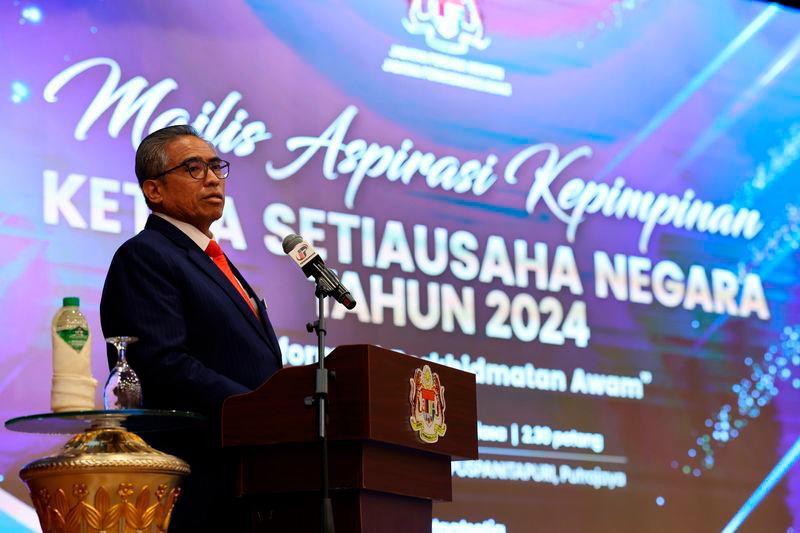PUTRAJAYA: The Public Service faces three significant challenges, which are becoming increasingly complex and demand urgent improvements, said Chief Secretary to the Government Tan Sri Shamsul Azri Abu Bakar.
Shamsul Azri noted that, from his personal observation, the first challenge is the entrenched mentality of working in silos, and the pervasive bureaucracy still present in some government agencies.
He explained that this issue arises from a sense of superiority or self-importance among the agency’s staff, to the extent that it appears they believe absolute power resides solely within their agency.
“So, if you want to approve one of those development projects, you have to go through a process that involves all these ministries and agencies. Correct, each one has its own function and role.
“However, this should not justify excessively long processing times for projects, which can delay completion, and fail to meet stakeholders’ and customers’ expectations,” he said, in his speech at the KSN Leadership Aspiration Programme, here, today.
Shamsul Azri identified the second challenge as the use of outdated, inefficient, and non-competitive methods in service delivery.
He noted that this challenge aligns with the Public Complaints Bureau report, which highlighted that most complaints this year were related to unmet customer expectations, issues with public facilities and infrastructure, and weak enforcement.
“We are talking about technology designed to enhance service delivery efficiency, yet we still receive complaints from customers such as ‘the Government is slow,’ ‘the Government is indifferent,’ and ‘out of ten counters, only one is open,’ among others.
Commenting further, Shamsul Azri identified the third challenge as concerns about the integrity of public servants, acknowledging that ‘Little Napoleons’ still exist within government organisations.
He cited statistics from the Malaysian Anti-Corruption Commission (MACC), which reported 408 arrests involving civil servants, compared to 318 arrests for the same period last year.
“We also tend to become complacent with what we have, which I believe is due to a lack of appreciation for the values that guide us as individuals, such as the MADANI concept mooted by the Prime Minister (Datuk Seri Anwar Ibrahim). It is clear that these values are still weakly integrated,” he said.
Shamsul Azri emphasised that addressing these challenges requires immediate improvements, aligned with the goal of implementing comprehensive public service reforms.
“It is crucial to ensure that all highlighted initiatives are of high quality, and truly resonate with the needs of the people,” he said.
Shamsul Azri also suggested that a form of award, recognition or appreciation be created as an encouragement for ministries and civil servants to increase efficiency and make improvements.
“Call it something like the Public Service Reform Excellence Award or any appropriate name. I am confident that this will boost their spirit to stay committed to improving their performance and service delivery, meet people’s expectations, and build a better future for Malaysians,” he said.
On the second key enabler which is total communication, Shamsul Azri called on the government to make improvements to the publicity aspect by creating strategic notifications by taking advantage of various platforms, especially social media.
“In making a plan, the aspect of publicity or, simply say, having the publicists to promote our initiatives, our improved services, the complaints that we have responded to and so on, was often neglected.
“In our country, the number of active social media users is estimated to reach 26.8 million. Meaning, we have the same amount of space and opportunity to publicise what the public service and the government are doing,” he said.
The Chief Secretary also praised the strategic response shown by the Immigration Department in social media recently which was described as a ‘show without telling’ action to convey clearly that the department is serious about dealing with their customers’ complaints.
Therefore, he said the government needs to have continuous engagement with the media in addition to mainstreaming the media (corporate communication) teams in all ministries and departments.
“I am serious about this. For me, the media team in ministries and government departments must master and be at the forefront of cyberspace.
“They need to understand the spirit and philosophy of each initiative and aspiration by the government. Therefore, it is important that this team is equipped with the latest media competencies, equipment and facilities, especially related to social media,” he added.
Also present at the programme was Communications Ministry secretary-general Datuk Mohamad Fauzi Md Isa and Malaysian National News Agency (Bernama) chief executive officer Nur-ul Afida Kamaludin.









